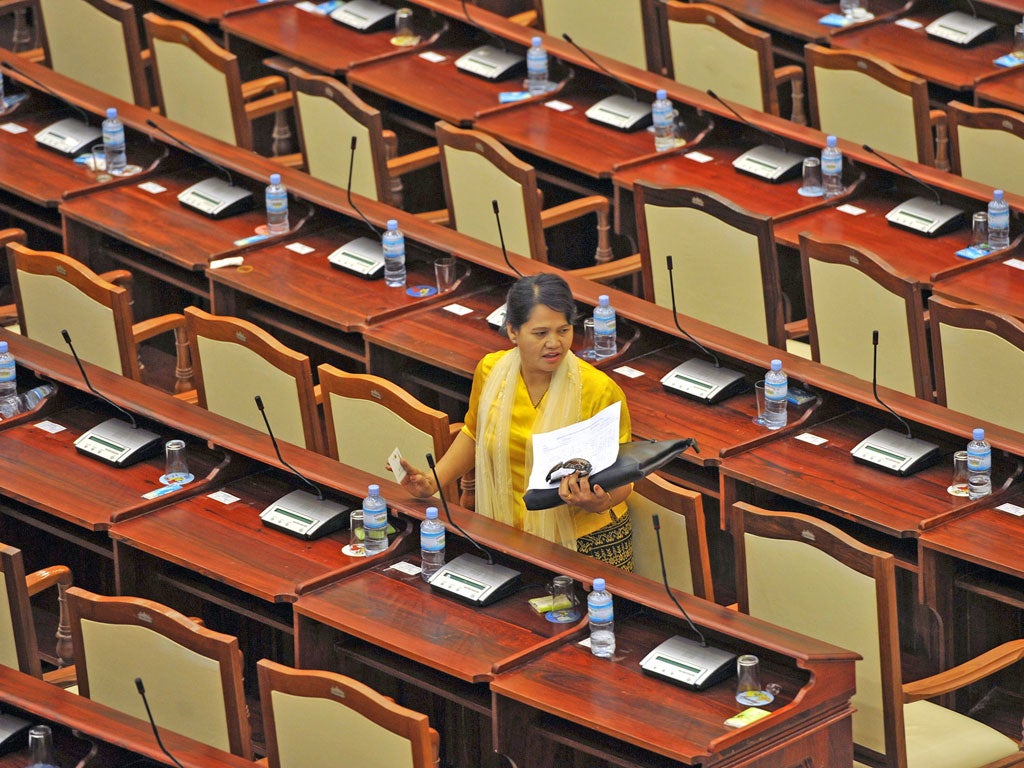EU suspends sanctions as Suu Kyi refuses to take her seat
Row over swearing of parliamentary oath prevents NLD party from joining assembly

Your support helps us to tell the story
From reproductive rights to climate change to Big Tech, The Independent is on the ground when the story is developing. Whether it's investigating the financials of Elon Musk's pro-Trump PAC or producing our latest documentary, 'The A Word', which shines a light on the American women fighting for reproductive rights, we know how important it is to parse out the facts from the messaging.
At such a critical moment in US history, we need reporters on the ground. Your donation allows us to keep sending journalists to speak to both sides of the story.
The Independent is trusted by Americans across the entire political spectrum. And unlike many other quality news outlets, we choose not to lock Americans out of our reporting and analysis with paywalls. We believe quality journalism should be available to everyone, paid for by those who can afford it.
Your support makes all the difference.The EU yesterday said it was suspending almost all sanctions against Burma, even as a dispute over the swearing of an oath prevented Aung San Suu Kyi and her elected colleagues from taking their seats in parliament.
During a meeting in Luxembourg, EU foreign ministers said they would retain an arms embargo while suspending sanctions that include asset freezes on more than 1,000 firms and travel bans on 500 individuals. The EU will however "monitor closely the situation on the ground [and] keep its measures under constant review".
In London, David Cameron, who recently became the first sitting British prime minister in history to visit Burma, said: "President Thein Sein has taken important steps towards reform in Burma, and it is right for the world to respond to them."
The decision was widely anticipated and most observers welcomed a loosening of restrictions in order to encourage Thein Sein and his purportedly civilian senior colleagues to continue with the sorts of reforms that have earned so many headlines in recent months and persuaded the West to change its behaviour towards Burma. The US and Australia are also loosening sanctions.
But some are concerned that sanctions are being dropped too quickly and that it remains uncertain whether Thein Sein and those behind him are truly committed to lasting reforms. They point out that, while Ms Suu Kyi and other high-profile political prisoners have been released from jail, hundreds remain behind bars. They also say there continues to be a brutal military operation against ethnic rebels and that despite Ms Suu Kyi's success in by-elections held earlier this month, a military-backed party still dominates the parliament.
"Without clear benchmarks and timelines for progress there is a danger the government will assume sanctions are in effect over, and the European Union will have little influence left," said Mark Farmaner of the Burma Campaign UK. "European companies now looking at Burma as a place where they can grab resources on the cheap and exploit cheap labour will face vociferous public campaigns by groups in Europe."
Western companies have long made clear their desire to reap the riches of Burma. While sanctions have been in place, deals to exploit the country's oil, gas, minerals, gems and timber have already been snapped up largely by Chinese, Thai, South Korean and Indian companies.
One indication that things will not be easy for Ms Suu Kyi and the 42 other members of her National League for Democracy (NLD) elected to the lower house of the parliament is a dispute over what oath she and her colleagues should swear. The NLD objects to the current oath that requires MPs to vow to "defend" or "safeguard" the constitution and wants the words changed to "respect" or "observe".
Her party says it would be inappropriate to swear such an oath since a priority for the NLD is to change the constitution. The party had hoped to persuade the government to amend the oath so that its MPs could attend yesterday's ceremony to reopen parliament in Naypyidaw. Instead, it opened without Ms Suu Kyi and her colleagues.
What happens next is unclear. If a change in oath requires a change in the constitution, it would need the support of 75 per cent of MPs.
Join our commenting forum
Join thought-provoking conversations, follow other Independent readers and see their replies
Comments